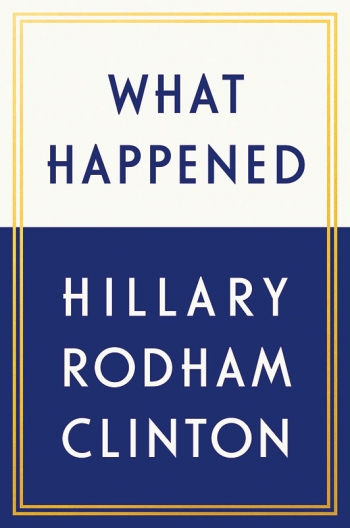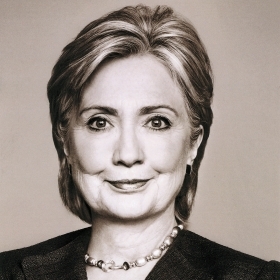Hillary Rodham Clinton’s raw, often painful memoir of the 2016 presidential race doesn’t claim to be the last word on how Donald Trump made it to the Oval Office. “That’s not for me to write—I have too little distance and too great a stake in it,” she writes. But after losing to “perhaps the least prepared man in history,” Clinton wants to set the record straight. And recent headlines are focusing new attention on her version of events.
“We can’t understand what happened in 2016 without confronting the audacious information warfare waged from the Kremlin, the unprecedented intervention in our election by the director of the FBI, a political press that told voters that my emails were the most important story, and deep currents of anger and resentment flowing through our culture,” she writes. “I know people don’t want to hear about these things, especially from me, but we have to get this right.”
Yes, an unusually frank tone of self-pity and bitterness runs through her account. But, as in any Clinton memoir, data, analysis, timelines, historical references, and observations gleaned from years in public life also abound. Moreover, ongoing investigations into issues such as media bias lend credence to her point of view.
Women pay a cost for competing in American politics, especially at the highest levels, Clinton writes. As the first woman nominated by a major party to the presidency, she’s in a unique position to talk about it. Anyone who runs for public office faces criticism. But how many men in public life have a bad hair day that makes headlines? Criticism of Clinton, from her early days as a gubernatorial spouse in Arkansas, has been relentless (clothes, makeup, voice, body, career, family, finances, name). As she sought public office for herself, the criticism turned venomous. (Think T-shirts and coffee mugs depicting Trump holding up Clinton’s severed head.)
“I’ve been in politics for a long time, but I was taken aback by the flood of hatred that seemed only to grow as we got closer to Election Day,” she writes. “I had left the State Department one of the most admired public servants in America. Now people seemed to think I was evil.”
Even so, she was heavily favored in endorsements, funding, and most polls, and widely expected to prevail. In her view, the reason she didn’t comes down to the email scandal that wouldn’t die.
Clinton calls her decision to use a personal email account for official business “a dumb decision,” but an “even dumber scandal.” Emails are a perfect story for stressed media outlets whose funding has shifted from subscriptions and local business advertising to internet hits. While Trump’s gaffes created a new normal of one-day stories, Clinton’s email woes, fueled by a steady drip of WikiLeaks releases and an unusually public FBI investigation, endured until Election Day.
In the end, Clinton’s emails got more coverage than any other issue in the race—four times that of Trump’s treatment of women and 16 times the attention given to Clinton’s most heavily covered policy position, according to a study by Harvard’s Shorenstein Center.
Clinton devotes five pages in her memoir to an interview with Matt Lauer for NBC’s “Commander-in-Chief Forum.” The format was to feature side-by-side, half-hour interviews with each candidate to discuss national security and foreign policy. Rarely asked about her foreign policy experience on the stump, the former secretary of state was hopeful. Finally, voters would see that she was ready to be commander in chief, while Trump was “dangerously unprepared,” just two months before the election.
That never happened. Instead, Lauer spent a third of the interview grilling Clinton on her use of a personal email server for official State Department business. “Wasn’t it disqualifying, if you want to be commander in chief?” he asked. By contrast, Trump got questions such as, “What do you believe prepares you to make decisions that a commander in chief has to make?”
“I was almost physically sick,” Clinton writes.
In December 2017, Lauer was fired for sexually harassing female colleagues. CBS and PBS suspended journalist Charlie Rose, and NBC and MSNBC suspended Mark Halperin over similar issues.
Suddenly, their coverage of Clinton faces new scrutiny. “A pervasive theme of all of these men’s coverage of Mrs. Clinton was that she was dishonest and unlikable,” wrote Jill Filipovic in a Dec. 1, 2017, op-ed in the New York Times, “The Men Who Cost Clinton the Election.” “When the harassers are men with loud microphones, their private misogyny has wide-reaching public consequences. One of the most significant: the 2016 election.”
Gail Russell Chaddock covered politics for the Christian Science Monitor from 1987 to 2016.








We ask that those who engage in Wellesley magazine's online community act with honesty, integrity, and respect. (Remember the honor code, alums?) We reserve the right to remove comments by impersonators or comments that are not civil and relevant to the subject at hand. By posting here, you are permitting Wellesley magazine to edit and republish your comment in all media. Please remember that all posts are public.